2017 Central America Unification Lecture (Sao Paulo, Buenos Aires, Mexico City)
The 2017 Central America Unification Lecture, whose objective is to spread expatriate consensus on disposing of North Korean nuclear weapons and establish a foundation for unification after the North Korean nuclear experiments and missile launches as well as strengthen unification capabilities, was successfully held from March 6 to 13 in Sao Paulo, Brazil (March 6), Buenos Aires, Argentina (March 9), and Mexico City, Mexico (March 13).
On March 6, a unification lecture was held at Sao Paulo Novotel in Brazil with the attendance of around 150 people including Hong Young-jong, Consul General of the Republic of Korea in Sao Paulo, Kim Yo-jin, Chief of the Korean Association in Brazil, Bom Retiro, member of the Brazilian military command, local Koreans, and representatives of social associations.
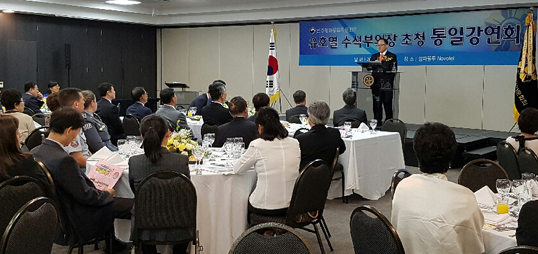
View of the Venue of the Unification Lecture in Brazil
At the event, which began with an opening address by Chapter Head Park Dae-geun, Hong Young-jong, Consul General of the Republic of Korea in Sao Paulo, said in his congratulatory address that the North Korean regime is focusing only on strengthening its nuclear arsenal through nuclear experiments and ballistic missile launches. “The recent assassination of Kim Jong-nam was a reminder for the entire world of the ruthless and reckless behavior of the North Korean regime. In this situation, the compatriot society in Brazil must bond together under a resolute spirit of security to strengthen the will toward unification, and I am certain that this lecture will be a great opportunity for compatriots in Brazil to strengthen their will for unification,” he added.
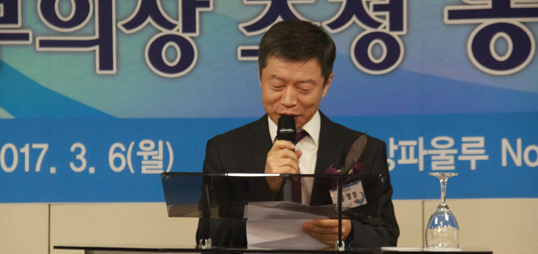
Hong Young-jong, Consul General of the Republic of Korea in Sao Paulo, Giving a Congratulatory Address
In his congratulatory address, Kim Yo-jin, Chief of the Korean Association in Brazil, thanked Executive Vice-chairperson Yoo Ho-yeol who attended this event on behalf of 50,000 Koreans living in Brazil, and expressed certainty that this special lecture will be an opportunity for compatriots to think about their calling and duty and about unification.
Executive Vice-chairperson Yoo Ho-yeol gave a lecture on △the justification of unification, △difficulties in unification, △effectiveness of sanctions imposed by the international community, and △ paradox of the North Korean society as revealed through the market.
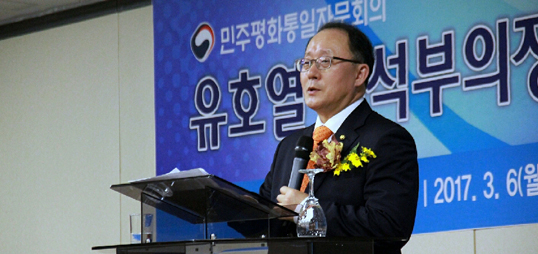
Executive Vice-chairperson Yoo Ho-yeol Giving a Lecture on the Topic, ‘Disposing of North Korean Nuclear Weapons and Establishing of Foundation for Unification, along with Overseas Koreans’
Asking the question “Why should we pursue unification?” in the beginning, Executive Vice-chairperson Yoo Ho-yeol noted that, in the past, unification was believed to be the obvious objective and power of Koreans. “Now, however, we are in the situation of having to explain the justification for unification to the younger generation and the international community,” he said.
In particular, regarding the North Korean nuclear issue, he said that there are still negative responses to the effect of the sanctions imposed by the international community, but that the effect of the sanctions can be manifested differently according to various situations. “The effect of the sanctions is greater for countries that are open to the outside and which have high external reliance. Since North Korea is not like that, the effect is not immediately tangible. It is not yet the time to give up peaceful measures, and we must resolve this issue peacefully,” he stressed.
According to him, in this era of 30,000 North Korean defectors, South Korea remaining in a system of merely resolving its economic difficulty has no relation to unification. “We must make the defectors feel the values and identity as citizens of South Korea, including how valuable it is to live in South Korea, in order to promote unification,” he added.
Also mentioning the paradox and abnormality of North Korea as revealed through the wrong political judgment of nuclear weapons and the market, he urged the participants to overcome this situation not only through temporary measures but through the unified will of the government, citizens, and overseas Koreans toward unification.
Lastly, he concluded the lecture by requesting that “Compatriot leaders do their part to demonstrate kkang (tenacity) for action, kkeun (strong bond), kkoe (wisdom), and kki (talent) for unification.”
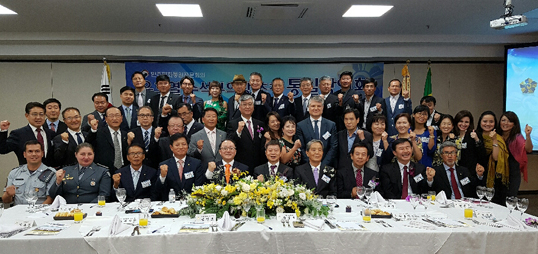
Group Photo of Major Participants to the Unification Lecture in Brazil
The unification lecture was hosted on March 9 in Abasto Hotel in Buenos Aires, Argentina, with around 100 people in attendance including Choo Jong-youn, Korean Ambassador to the Argentine Republic, Lee Byung-hwan, President of the Asociacion Coreana en la Argentina, local Koreans, and representatives of social organizations.
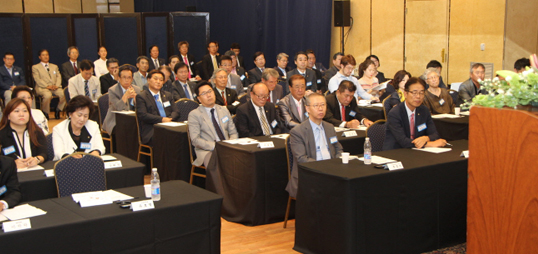
View of the Venue of the Unification Lecture in Argentina
Chapter Head Lee Hak-rak expressed his expectations for the lecture in his opening address. “The Kim Jong-un regime, now in its fifth year, is threatening and unpredictable, threatening the security of the entire world. Although there has yet to be a way to stop North Korea’s missile and nuclear development, I hope that this unification lecture becomes the starting point for the compatriot society to gain significant traction,” he added.
In his congratulatory address, Choo Jong-youn, Ambassador to Argentina, said that, at this point when the diplomatic relations between Korea and Argentina are blossoming, the visit of Executive Vice-chairperson is warmly welcomed. “As the current situation of the Korean Peninsula is complicated and grave, we expect to find a clue for its resolution through this lecture,” he said.
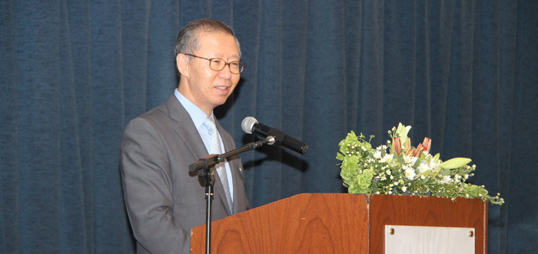
Choo Jong-youn, Korean Ambassador to the Argentine Republic, Giving a Congratulatory Address
According to Lee Byung-hwan, President of the Asociacion Coreana en la Argentina, not only is the unification of the South and North important, but the unification of national opinion is also crucial. He urged the ruling and opposition parties, conservative and progressive people to overcome the schism and foster an attitude geared toward citizens.
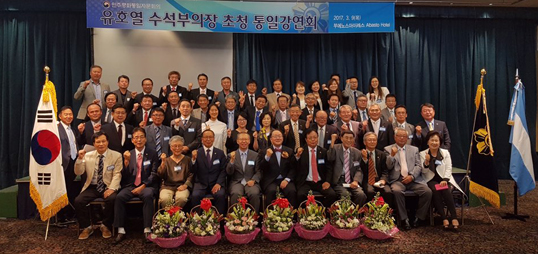
Group Photo of Major Participants to the Unification Lecture in Argentina
“Through various interviews on Argentinian media, I realized that Argentina has great interest in the THAAD issue on the Korean Peninsula and knows a lot about the flow and influence of the international community. I felt once again that the North Korean issue is a worldwide issue,” the Executive Vice-chairperson said in his lecture.
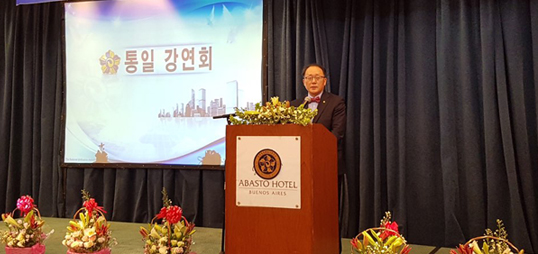
Executive Vice-chairperson Yoo Ho-yeol Giving a Lecture in Buenos Aires
Lastly, a unification lecture was held at Marriott Hotel in Mexico City on March 13 with the attendance of around 80 people including Jeon Bi-ho, Korean Ambassador to Mexico, faculty of Mexico Hangul School, local Koreans, and key personnel of social organizations.

View of the Venue of the Unification Lecture in Mexico
“Peaceful unification is a most important objective that must not be stopped. We have the duty to form a consensus around the world and spread awareness of the human rights and internal issues of North Korea. If council members work to form a consensus on unification and concentrate their capabilities, small powers will combine to become the foundation for peaceful unification,” Chapter Head Oh Byung-moon said in his opening address.
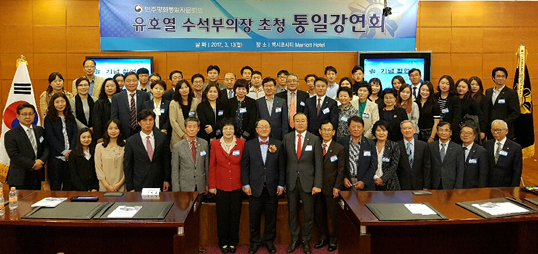
Group Photo of Major Participants to the Unification Lecture in Mexico
In his congratulatory address, Jeon Bi-ho, Ambassador to Mexico, noted that Mexico actively supports South Korea in this crisis on the Korean Peninsula. “The government of South Korea will work with the international community for the denuclearization of North Korea and strongly punish provocations from the North. Creating a unified country based on liberal democracy is the optimal way to realize a take-off for our people, so council members must work to concentrate the capability of Koreans in Mexico and to nurture an environment of international cooperation,” he stressed.
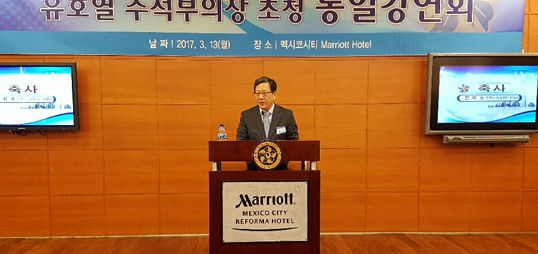
Jeon Bi-ho, Korean Ambassador to Mexico, Giving a Congratulatory Address
According to Executive Vice-chairperson Yoo Ho-yeol, Mexico and Central America should further advance economic exchange and cooperation with Korea and cooperate more closely to resolve the unification issue of the Korean Peninsula. “The Central America and Caribbean Chapter has pioneered the construction of the Cuba Korean Descendant Cultural Center and performed active regional activities. The Cultural Center will fulfill the role of helping improve relations with Cuba, a nation with no diplomatic ties with Korea, as well as letting descendants know about the power and pride of Korea,” he added.
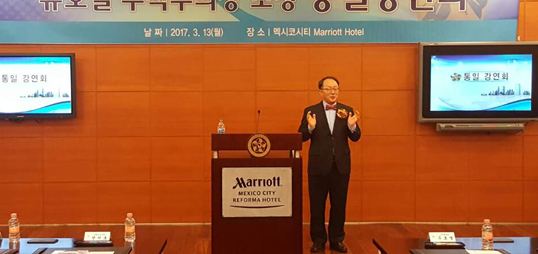
The Executive Vice-chairperson Giving a Lecture in Mexico City
The council members and local compatriots attending the lecture in Central America commented that this lecture was an opportunity to realize the specifics of the conditions on the Korean Peninsula and the reality of North Korea and vowed to work to form global consensus on unification in the future.













